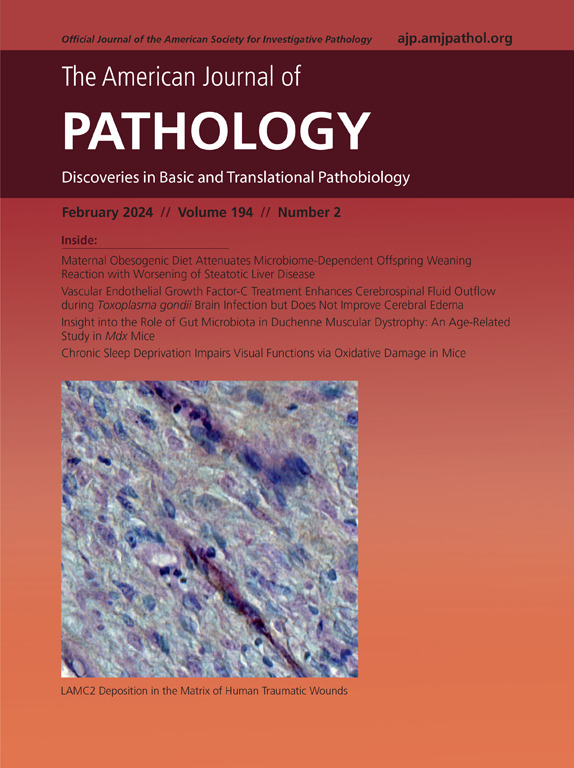严重急性呼吸综合征冠状病毒2、人胎盘和不良围产期结局。
IF 3.6
2区 医学
Q1 PATHOLOGY
引用次数: 0
摘要
妊娠期冠状病毒病2019 (COVID-19)的发病时间和严重程度、胎盘病理和不良妊娠结局之间的关系尚不清楚。对497例经胎盘系统病理检查的妊娠COVID-19患者进行前瞻性队列研究。主要暴露时间是怀孕期间(妊娠早期/中期与妊娠晚期)感染COVID-19的时间。主要结局是复合胎盘病理,包括高级别母体血管灌注不良或绒毛周围纤维蛋白沉积25%。63例患者有复合胎盘病理结果。在控制产妇年龄、胎次、分娩时活动性感染、从诊断到分娩的间隔时间和COVID-19变异的调整分析中,妊娠期间COVID-19的时间与复合胎盘病理结局的风险无关。在被调查的继发性COVID-19相关暴露中,疾病严重程度和COVID-19治疗与复合胎盘病理结果的风险相关。此外,COVID-19患者在大流行的前9个月的复合胎盘病理结果率最高。在这个大型队列中,胎盘血管病理在COVID-19病例中很常见,但与妊娠期间COVID-19的时间或不良妊娠结局无关。这些发现表明,妊娠期无并发症的COVID-19不需要进行密集的胎儿监测或分娩后对胎盘进行详细的病理检查。本文章由计算机程序翻译,如有差异,请以英文原文为准。

Severe Acute Respiratory Syndrome Coronavirus 2, the Human Placenta, and Adverse Perinatal Outcomes
The relationship among timing and severity of coronavirus disease 2019 (COVID-19) during pregnancy, placental pathology, and adverse pregnancy outcomes is not well understood. A prospective cohort study of 497 pregnant patients with COVID-19 whose placentas underwent systematic pathologic examination was conducted. The main exposure was timing of COVID-19 during pregnancy (first/second versus third trimester). The primary outcome was composite placental pathology that included high-grade maternal vascular malperfusion or >25% perivillous fibrin deposition. Sixty three patients had the composite placental pathology outcome. In adjusted analyses that controlled for maternal age, parity, active infection at delivery, interval from time of diagnosis to delivery, and COVID-19 variant, timing of COVID-19 during pregnancy was not associated with risk of the composite placental pathology outcome. Among the secondary COVID-19–related exposures investigated, severity of disease and treatment for COVID-19 were associated with risk of the composite placental pathology outcome. In addition, patients with COVID-19 in the first 9 months of the pandemic had the highest rate of the composite placental pathology outcome. In this large cohort, placental vascular pathology was common among COVID-19 cases but was unrelated to the timing of COVID-19 during pregnancy or adverse pregnancy outcomes. These findings suggest that uncomplicated COVID-19 during pregnancy does not require intensive fetal surveillance or detailed pathologic examination of the placenta after delivery.
求助全文
通过发布文献求助,成功后即可免费获取论文全文。
去求助
来源期刊
CiteScore
11.40
自引率
0.00%
发文量
178
审稿时长
30 days
期刊介绍:
The American Journal of Pathology, official journal of the American Society for Investigative Pathology, published by Elsevier, Inc., seeks high-quality original research reports, reviews, and commentaries related to the molecular and cellular basis of disease. The editors will consider basic, translational, and clinical investigations that directly address mechanisms of pathogenesis or provide a foundation for future mechanistic inquiries. Examples of such foundational investigations include data mining, identification of biomarkers, molecular pathology, and discovery research. Foundational studies that incorporate deep learning and artificial intelligence are also welcome. High priority is given to studies of human disease and relevant experimental models using molecular, cellular, and organismal approaches.

 求助内容:
求助内容: 应助结果提醒方式:
应助结果提醒方式:


